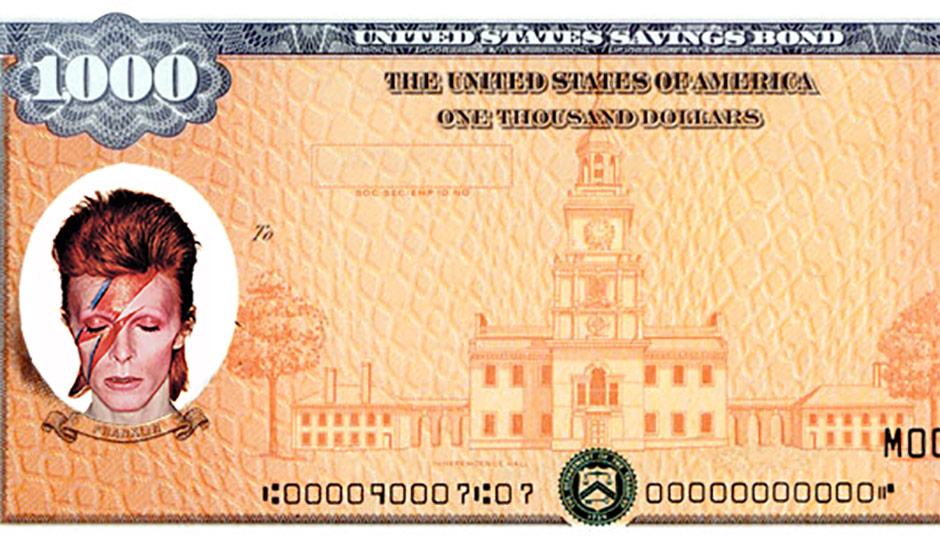Like what you’re reading? Stay in touch with BizPhilly — here’s how:
A Penn Graduate Was the Inventor of “Bowie Bonds”

Not an actual Bowie bond.
After learning the news of David Bowie‘s death yesterday, musicians worldwide expressed their gratitude and called him an inspiration. Banker David Pullman was praising and thanking Bowie, too, for giving him the chance for his big break. Pullman invented a new type of financial instrument in the 1990s: Bowie bonds.
“I was going to the most savvy conferences, these world summits of the industry,” said Pullman, who spent four years as a Penn undergrad and also went to Wharton. “The first question the rating agencies, the investors always asked was, ‘Did you meet David Bowie?’ The second question always was: ‘Did you meet Iman?’ Every single conference it was the same questions about meeting Bowie and his wife. I was at Gleneagles … and they played ‘The Man Who Sold the World.’ I’m waiting to go out on the stage, and this music is exactly what happened. I sold these bonds to the world.”
Bowie bonds were a revolutionary concept where Bowie would securitize his back catalog. Per the Financial Times, the move was “effectively a loan backed by the future payments.” Artists would get a lump sum of money now without having to wait for future royalties. Pullman came into contact with Bowie through his business manager, Bill Zysblat.
“Once I explained it to him, David said, ‘Why haven’t we started yet?’ ” Pullman said. “He was very supportive. He never questioned it for a minute. No one had ever even attempted this, less even talked about it. No one had even written about the idea! It was totally brand new, but David got the concept instantly.”
Bowie Bonds promised a 7.9 percent interest rate paid over 10 years. Moody’s rated the securitization at A3, the seventh-highest rating. Forbes says Prudential bought the 1997-issue $55 million bonds and held them privately.
Originally laughed at — “This isn’t a joke, is it?” a portfolio manager told the Wall Street Journal in December 1996 — the bonds became a legitimate financial innovation. Pullman later pulled together similar deals for Ashford & Simpson and the Isley Brothers. Even yesterday, Bowie bonds were all over the news. (The Wall Street Journal used the cringe-worthy/awesome headline, “The Man Who Sold the World … and Bonds.”)
The Londoner quoted economist Evan Davis, who argued that Bowie bonds inspired the securitization that led to the credit crunch and worldwide recession. (He says he was being tongue-in-cheek.) Pullman got a lot of attention at the time, in part because Bowie always directed journalists to him.
“He could have done the interviews,” said Pullman. “A lot of people are narcissistic, I get that — myself included. But the press wanted to talk to Bowie and he said, no, ‘Talk to David Pullman.’ They were talking to me like I was David Bowie. They had no choice!”
Bowie bought out former manager Tony DeFries‘ interest in his back catalog with some of the proceeds, according to Pullman. He licensed his back catalog to EMI at the same time as the bond sale. Things didn’t go perfectly. Streaming and piracy decimated the revenue streams of album sales. Moody’s eventually downgraded Bowie Bonds to a notch above junk. Debt issued by EMI was dropped to junk status. But the Bowie bonds paid off after 10 years, and Moody’s dropped the rating. Pullman says the Isley Brothers and Ashford & Simpson bonds paid off, too.
Pullman grew up in the area and graduated from Penn in 1983. He lived in what was then called High Rise East (now Harnwell College House) and later lived at 2601 Pennsylvania Avenue.
“Bowie made me famous,” Pullman said. “He launched my career. I was young. I was always grateful for that. … If I am standing on someone’s shoulders it’s David Bowie’s.”
Follow @dhm on Twitter.


